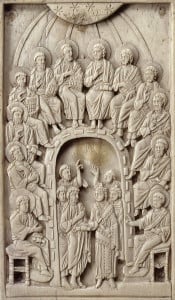Pentecost: a distinctive feast
4 June 2023‘I shall be with you always, to the end of the world’ (Matth. 28, 20).
With these words, Jesus bade farewell to his disciples, at his ascension from the Mount of Olives. His last act is a departure, but also a promise. These two actions seem to be contradictory but they aren’t really: Christ isn’t present any more in the familiar form with which the apostles were acquainted, but he promised he wouldn’t abandon them as orphans.
‘I shall send you what my Father has promised; but stay in the city until you have been clothed with power from on high’ (Luke 24, 49). The promise was fulfilled. On the fiftieth day after Christ’s resurrection, the promise was met in Jerusalem, when the disciples had gathered, all of one accord, and were waiting for the promise to be fulfilled. The Holy Spirit descended on the disciples, the Comforter: ‘He will glorify me because it is from me that he will receive what he will make known to you. All that belongs to the Father is mine. That is why I said the Spirit will receive from me what he will make known to you’ (Jn. 16, 14-15).
From then until today, the Holy Spirit has remained in the Church. By guiding those who believe in Christ in the true faith and life and by making the Lord present continuously in the eucharistic assembly of the faithful and, by extension, in the everyday life of all the members of the Church.
You’ll say what has all of this to do with the title of the article? We know about the event of Pentecost. So it’s the same all over again… Allow me to share a few thoughts with each reader of this short text. I shan’t call it an article because for me it’s an opportunity for a kind of communication with each reader.
The Church always experiences all the works of divine dispensation at every eucharistic assembly. Just before he offers the bloodless sacrifice, the celebrant, in the name of all the faithful, says in a low voice: ‘Remembering therefore this our Savior’s command and all that has been done for us: the Cross, the Tomb, the Resurrection on the third day, the Ascension into heaven, the Sitting at the right hand, the Second and glorious Coming again…’.
The Church always experiences all the events of divine dispensation in a special way and it makes each one tangible to the faithful by celebrating it in a distinctive manner. Each handing-back of a feast is, in essence, a reinforcement of the event, because, simply stated, the requirement is to give meaning to the life of every believer and to fill their daily existence.
The above is written on the occasion of the feast of Pentecost. Even though the hymns call it the ‘last feast’, in the sense that it’s a recapitulation and completion of the Triune God’s work of salvation, in essence it’s also the first feast, the beginning of a new reality in human history. It’s the start of a new life, a new proposal for life and, at the same time, a call to walk the path suggested.
The faithful in all eras are given the opportunity to fulfill in their life Christ’s promise that he will always be with us, until the end of the world. The issue is whether we listen to this possibility which has been given to us. Do we hear it and simply let it go? Or do we heed it? Are we fired by it and do we set aside decisions about living in the here and now?
In the final analysis, is Christ the God of the cross and resurrection? Does our faith and religious conduct lie, in essence, in the zeal and enthusiasm of Great Week or, in the best case scenario, a few weeks more?
Aren’t Christ, his Gospel, the life he granted us through his mission on earth not for our everyday lives? Are they only for the days dedicated to him? Sundays and feasts at best? For the days and times that we decide?
Christ came into our everyday life in order to give this routine a different meaning- real life. You either taste this life or you don’t. You’re either going forward or you’re not. Christ calls on each of us to take a responsible stand on the issue of faith in him.
Within this ideological, social, political confusion and decline, which I would say is existential, the Church challenges and, simultaneously, invites everyone who’s genuinely seeking real life, to experience it in the community of the faithful, which is the Church. There they’ll come to know, come to experience the permanent presence of the Lord in the life of the Church and will taste what it means to be united to Christ and to other people.
I would like to close with the hymn we sing in the Presanctified Liturgy at the time when we prepare to come to communion: ‘Taste and see that the Lord is good’.
This opportunity is given to us within the Church, which inaugurates its presence in human reality and history with the event of Pentecost. Those who are bold enough to approach the Lord taste this new life which he alone offers to everyone, always.







